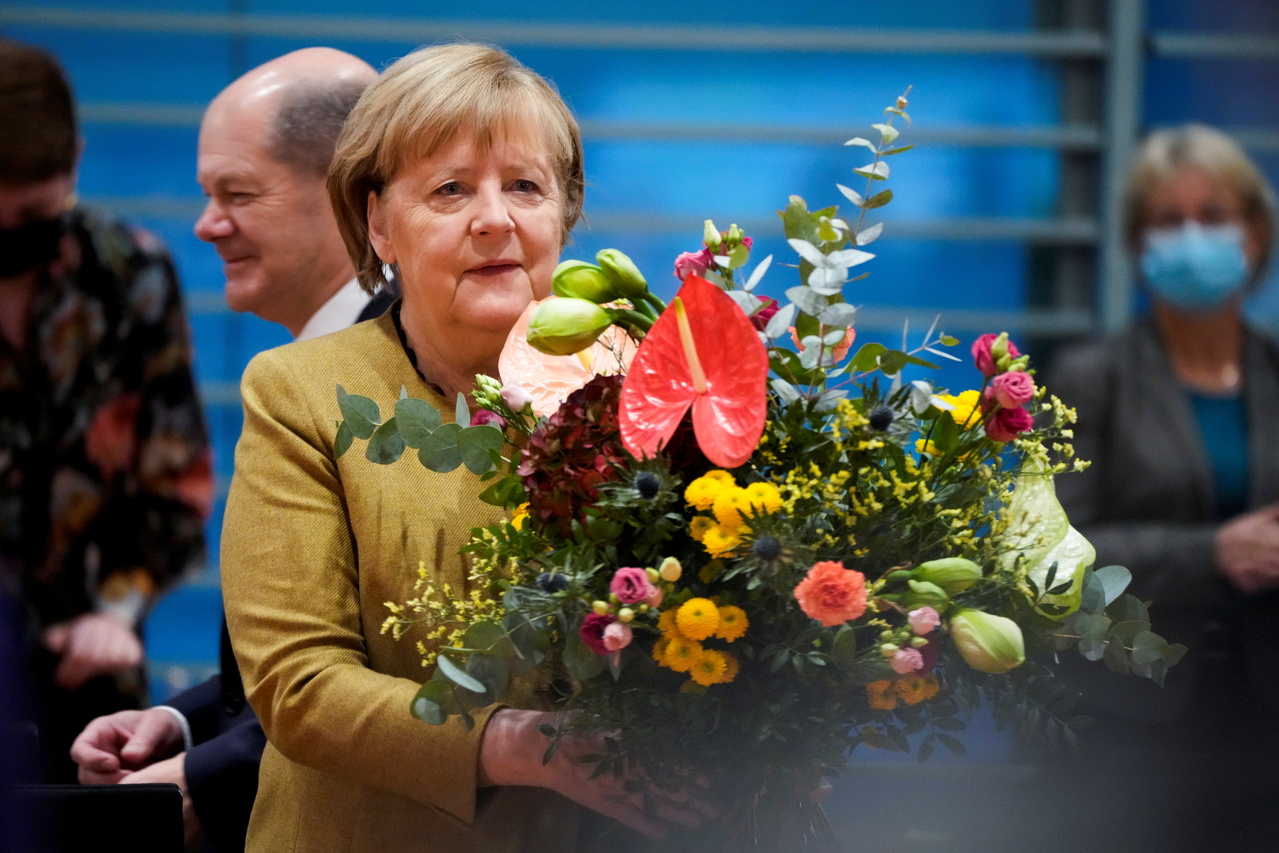Germany has new 3-party coalition govt, brings curtain down on Angela Merkel era
Sign up now: Get ST's newsletters delivered to your inbox

The deal will end 16 years of Merkel-led conservative government.
PHOTO: REUTERS
Follow topic:
BERLIN (REUTERS, BLOOMBERG) - German Chancellor-designate Olaf Scholz on Wednesday (Nov 24) hailed his Social Democrats' (SPD) new so-called "traffic light" coalition with the Greens and liberal Free Democrats as a groundbreaking alliance that he said will modernise the country.
"The first traffic light (in Germany) was erected in Berlin in 1924 in Potsdamer Platz. At that time, it was still an unusual technology. 'Can it work?' people asked sceptically," Mr Scholz said in Berlin.
"Today, the traffic light is indispensable when it comes to regulating things clearly and providing the right orientation and ensuring that everyone moves forward safely and smoothly. My ambition as chancellor is that this traffic light alliance will play a similarly groundbreaking role for Germany," he said.
The new coalition said it aims to accelerate the green transition in Europe's largest economy.
Mr Christian Lindner, chairman of the pro-business FDP and an advocate for fiscal discipline, is slated to become finance minister, according to a preliminary list of Cabinet posts seen by Bloomberg on Monday.
Mr Robert Habeck, the co-leader of the Greens who campaigned on ambitious spending to upgrade German industry and infrastructure, is expected to become a "super minister" overseeing the economy along with climate and energy policy.
The agreement by the centre-left SPD and its two partners will install Germany's first three-way federal coalition government since the 1950s and end 16 years of Merkel-led conservative government, marking a new era for relations with Europe and the rest of the world.
The alliance - named a traffic light coalition after the three parties' respective colours - has a majority in the Lower House of Parliament and hopes the government will be sworn in early next month after the parties ratify the coalition pact.
It faces immediate challenges, with Germany tackling its worst Covid-19 surge yet and Europe grappling with the fallout from Brexit and a crisis on the EU's border with Belarus.
Mr Scholz on Wednesday set out plans to steer Germany through the rest of the pandemic and position the country as a climate leader.
"The world is in upheaval, so we can't afford to stand still," Mr Scholz and his partners said in the coalition agreement. "If we shape these upheavals, there will also be great opportunities."
During her four terms as chancellor, Dr Merkel became one of the West's most respected leaders but left the country's industry exposed to threats from China's economic expansion and changing technologies.
The new government has a goal of becoming climate neutral by 2045.
Mr Scholz's alliance has vowed to eliminate coal-fired power plants by 2030 - eight years earlier than planned - and accelerate the transition to electric vehicles.
Germany's new government also plans to invest more heavily in trains and electric-car infrastructure while returning to constitutional restrictions on government borrowing.
Despite the bold statements, many of the policies remain vague, and there are question marks over how the disparate parties will work together under the real-world pressures of government.
Already Mr Scholz and his allies have been slow to react to a record surge in Covid-19 infections, which is overloading hospitals in hard-hit areas. The coalition is creating a task force to address the pandemic, but did not announce concrete steps yesterday.
Mr Scholz, a low-key pragmatist in Dr Merkel's mould, has years of experience as finance minister, mayor of Hamburg and an SPD heavyweight dating back to Gerhard Schroeder's chancellorship. However, many of his potential Cabinet members are untested, and the parties' disparate positions create plenty of scope for bickering.
Merkel bids farewell
Presiding over what could be her final Cabinet meeting, Dr Merkel bade her colleagues farewell, and Mr Scholz presented the EU's longest-serving leader with a tree to plant in her garden, according to a person at the meeting.
As finance minister and vice-chancellor in the outgoing "grand coalition" of the SPD and conservatives, Mr Scholz, 63, was seen as a competent rather than a charismatic politician who, like Dr Merkel, has moderate views and is adept at dialogue.
Dr Merkel did not seek re-election after four terms as chancellor. Her personal popularity ratings remain high, but her party is in disarray and facing a leadership contest after achieving its worst results in a federal vote following a gaffe-prone campaign by its candidate for chancellor.

